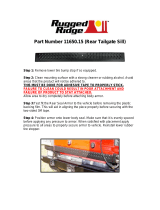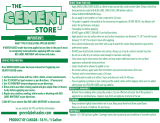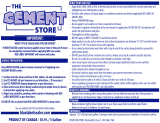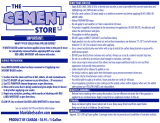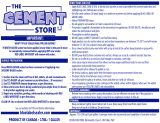Page is loading ...

PRODUCT DESCRIPTION
BENEFITS/FEATURES
SUGGESTED APPLICATIONS
TECHNICAL INFORMATION
COVERAGE
SHELF LIFE
PACKAGING
The Armor AG BROWN SEAL is a solvent-based acrylic sealer designed to enhance, seal, and protect exposed aggregate con-
crete surfaces. It will darken the surface with a semi-transparent brown tint, enhance dull and faded coloring, and protect the sur-
face with a durable high gloss surface film. The Armor AG BROWN SEAL is a fantastic sealer if you are looking to bring out
dull and faded surfaces, and enhance surfaces with a high gloss wet look finish. Non-slip additives are also available.
Solids………………………………………………25%
Drying Time……………………………………….1-2 hours
Re-Coat Time…………...…………………………24 hours
Foot Traffic..............................................................24 hours
Wheel Traffic...........................................................24 - 48 hours
Application Temp....................................................45°F - 85°F
When properly sealed and stored, the shelf life of the Armor AG BROWN SEAL is up to 1 year.
The Armor AG BROWN SEAL is available in a 16 OZ Sample, 1 Gallon Bottle, 5 Gallon Pail, and 55 Gallon Drum.
Porous Surfaces: Up to 175 FT2/gallon in one coat.
Smooth Surfaces (once properly prepped): Up to 200-225 FT2/gallon in one coat.
Coverage will vary depending on porosity, surface condition, application method, and the amount of material applied by the applicator. The
above coverage rates are estimates and will vary. Two coats are suggested for even coverage and appearance.
Wet Appearance........................Semi Transparent Brown-Tinted
Dry Appearance......Semi-Transparent Brown-Tinted High gloss
VOC Content............................................Low VOC
Blush Resistance.......................................Good
Solvent Resistance....................................Minimal
Concrete Adhesion....................................Excellent
Armor AG Brown Seal
Brown-Tinted High Gloss Acrylic Sealer
Foundation Armor
3 Howe Drive, Suite 2
Amherst, NH 03031
(866) 306-0246
FoundationArmor.com
For Professional Use
Breathable, UV resistant
Reduces deterioration caused by surface abrasion
Reduces the formation of mold, mildew, and algae
Reduces surface stains
Provides a semi-transparent brown-tinted finish
Easy to apply, maintain, and recoat
Made from US Manufactured non-recycled resins
Will darken the surface to make it look wet
Can be applied to unsealed surfaces, and surfaces previously
sealed with a solvent based acrylic sealer
Exposed aggregate concrete.
Driveways, walkways, and stairs.
Pool decks and patios.
CONTACT
Still have questions? Contact a Foundation Armor Technician at 866-306-0246.

APPLICATION INSTRUCTIONS
CLEAN-UP
PRODUCT REMOVAL
PRECAUTIONS AND LIMITATIONS
The Armor AG BROWN SEAL can be applied with a 3/8-1/2” nap roller, or an acetone/solvent resistant HVLP sprayer with Viton seals. For a consistent wet look and high gloss
finish, apply two coats spaced 24 hours apart.
Time Of Day
The Armor AG BROWN SEAL should only be applied in the early evening (around 5 PM or later) when air and surface temperatures are declining, and when the sun is no longer
positioned over the surface.
If applied outside of these limits, the sealer may not achieve adequate film formation and may have excessive air entrapment, bubbles, blushing or hazing.
Surface Preparation
The Armor AG BROWN SEAL should be applied to a completely clean and dry surface. If the surface was cleaned with water or pressure washed prior to application, allow the
surface to dry for at least 24 hours before sealing. While the surface may appear dry and feel dry to touch, water below the surface trapped in the pores can cause the same issues.
While pressure washing the surface is typically sufficient, spot treatment may be necessary for deep or older stains.
The Armor AG BROWN SEAL is designed specifically to be used on unsealed exposed aggregate concrete. It can also be applied to exposed aggregate concrete previously sealed
with a solvent based acrylic. The Armor AG BROWN SEAL should not be used to seal clay brick, red Chicago pavers, flagstone, slate, or natural stone. If you are looking to seal
clay brick, red Chicago pavers, flagstone, slate, or natural stone, consider instead of the Armor WL550 or the Armor SX5000 WB. If the concrete is smooth or trowel finished, and
doesn’t quickly and easily absorb water, other surface preparation may be required to open up the surface pores, such as acid etching or grinding. Do not apply to loose aggregate,
the Armor AG Brown Seal is not a bonding agent.
Adding Non-Slip: For best results, apply the Armor non-slip additive with an appropriate hand-held broadcast spreader. When applying the second coat, add the non-slip additive
to the coating using a broadcast spreader, and back roll to encapsulate the non-slip additive.
The applicator is responsible for suitability of application, and the results of the application. We suggest applying to a test area first to verify compatibility, absorption, coverage
rate, and project suitability.
Use Xylene. Dispose of containers in accordance with local and federal regulations.
Dried, cured sealer may be removed with a commercial paint stripper, or by using a diamond grinding method, sandblasting method or similar
mechanical action.
If applying indoors, room should be properly ventilated to allow for solvents to evaporate.
Keep away from open flames. Sealer is flammable and is susceptible to ignition.
Do not apply over floor adhesives, paints, water based coatings, or incompatible sealers.
Coverage rates depend upon many conditions including application method, surface porosity, and applicator.
Please be aware that this product when cured may be slippery when wet. Consider adding Armor Non Slip Additive into the top coat.
Sealer is not resistant to brake fluid, gasoline, and many other similar products.
It is not recommended to thin or cut sealer with any other products.
Sealer will darken the surface in order to enhance dull or faded surfaces.
White spots (blushing) and premature delamination or failure may occur if applied to wet surfaces, surfaces with moisture issues, surfaces that get wet before the sealer has
fully cured, or surfaces that currently have an incompatible sealer or coating down.
If applying sealer to pavers less than one year old, verify with paver manufacturer that pavers are able to be sealed. Sealing before suggested guidelines can result in coating
failure.
Sealer should be applied to concrete that has had 28 days to cure.
Do not apply in the morning or middle of the day to avoid hazing and bubbling.
Store product in an area where the temperature is between 50-80 degrees F, and not in direct sunlight.
It is recommended to wear the proper personal protective equipment when applying this product.
Properly protect and cover any areas not intended or suggested to be sealed during application.
Do not apply over water based acrylics, acrylic latex, paint, or any other film-forming coating other than a solvent based acrylic. Apply to a test area before sealing to verify
compatibility.
This product does not stop hot tire pickup. Hot tire pickup happens when the rubber/asphalt from the hot tire comes off of the tire onto the surface where the tire comes into
contact with. There is physically no way to stop the rubber/asphalt from coming off of the tire.
Plasticizers in rubber mats and rubber based materials may react and bond to cured coating.
/






